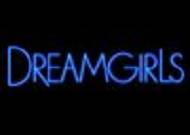|
|
||||
|
|
by Jeffrey Chen  I hate to just add my voice to a chorus that's already in the middle of singing loudly, but I simply have to -- Jennifer Hudson is the real deal in Dreamgirls. The ex-American Idol contestant plays Effie White, one of a trio of Supremes-like singers, in this adaptation of the of the stage musical and proceeds to steal her scenes. Her character is the one others say has the best voice, and she doesn't disappoint in that department, but perhaps the real surprise comes from the force with which she delivers an all-round performance. It's outsized, custom-made to take your breath away, but not hers. Actually, Dreamgirls derives much of its strength from its performances. The story itself is interesting enough, loosely based on the career of the Supremes, and covers the origins and rise of a Motown-like label for African-American performers called "Rainbow Records" during the '60s and '70s. Effie is part of the label's primary attraction, "The Dreamettes," which also includes Deena (Beyoncé Knowles) and Lorrell (Anika Noni Rose). When there's no singing or dancing going on, the movie works as an ode to the process of building up and making commercially viable black entertainers in a white entertainer-dominated field. Jamie Foxx plays Curtis, the business-minded mastermind behind Rainbow Records, and his machinations, many of which are underhanded and at the very least insensitive to those who may be close to him, no doubt reflect the kinds of deals and doings that had to be done to make such talent visible and lucrative. And while that provides a solid context and thematic framing for the lives of the story's main characters, the movie is really about putting on a show. It starts with a game cast without a weak performance among them, each given their own chances to shine. Dreamgirls becomes a mosaic of character personalities and the different ways they deal with fame, pressure, performing, and what they all owe one another as they make their journey together. They express themselves to us musically, and despite each of them having their own distinctive weaknesses, we find ourselves sympathizing with almost all of them -- the only exception may be Foxx, whose villainous role is bit of a thankless one; thus, he's actually overshadowed by everyone else, even though he's probably considered the best actor in the bunch. Meanwhile, the three strongest characters all feel like pleasant surprises. Knowles finds herself in a role that wisely downplays the star baggage that usually comes with a famous and attractive musical artist acting in a movie. Her character Deena would prefer to be a backup singer behind Effie, but she finds herself thrust into the spotlight by Foxx's Curtis -- she doesn't have quite the talents but her looks sell. Knowles is allowed to display an ironic humility that comes from knowing her appearance outshines her talents; meanwhile, she's still given the chance to sing up a storm for her numbers, each new song revealing what's going on in her mind. The part suits her because it's refreshing to see Knowles play someone who actually doesn't consider herself flashy. Eddie Murphy is also given a touching character arc playing James "Thunder" Early, a hybrid of James Brown and Little Richard. He's introduced as a callous womanizer, one with a style of living it up reflected appropriately by his manic performing style. He suffers the biggest hit when Curtis decides that, to be more appealing to a white audience, he must tone down his act and adopt something more loungy. To his credit, Murphy pulls all of this off so well that his character goes from being someone to whom we might not give a second thought -- a potential caricature -- to someone we start feeling a lot of pity for. But it's true that in the movie's most memorable moments, the show belongs to Hudson. Effie isn't an easy character to pull off -- she's got a diva personality and acts like she's owed something for her talents, but at the same time her frankness makes her endearing. When she sings, it's as if she's baring her soul with every performance. She suffers a downfall, but the moment of collapse results in her most astounding number, "And I Am Telling You I'm Not Going," during which all of Effie's qualities, from the blindness of her pride to the genuineness of her pain, come gushing out in the film's piece de resistance. If you aren't overcome with a welling feeling by the end of that act, then this might not be your kind of movie. This is most certainly a show -- in terms of enjoying it on the basis of pure showmanship, it's perhaps the most effective musical transition to the big screen since this current movie musical mini-revival began. (Released by DreamWorks and rated "PG-13" for language, some sexuality and drug content.) Review also posted at www.windowtothemovies.com. |
||
|
© 2025 - ReelTalk Movie Reviews Website designed by Dot Pitch Studios, LLC |



